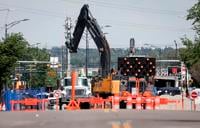TORONTO - Deciding whether to fix your aging car again or trade it in for a new one can be a tough calculation at the best of times, let alone when financing costs have significantly jumped and car prices have soared.
Whether to repair or replace your car comes down to balancing the cost and utility of the vehicle, according to Ben Mayhew, a financial planner and founder of Aergo Financial Planning in Halifax.
"But when you're in an environment where used car prices and new car prices are significantly higher, we need to go deeper on looking at that balance," he said.
He suggested finding a trustworthy mechanic who can help determine if an expensive repair could help defer acar purchase.
Whether to head to the garage also depends on the health of the other parts of the car.
If it's a big one-time cost and you're extending the car's use to the very end of its life, it could give the owner more time to save toward a vehicle purchase in the future, Mayhew said.
On the flip side, he said you don't want to get stuck in a constant repair cycle. "If you're having higher repair costs and not having access to the car when you need it more, it becomes a lifestyle decision."
He suggested comparing the cost of repairs to the monthly payments on a new car and evaluating whether the mechanic visits are going to be more taxing on your wallet than an auto loan.
Other experts remind car owners that regular maintenance could stave off a bigger bill.
"People think they're sinking money into something that doesn't have quite as much value," said Teresa Di Felice, assistant vice-president of government and community relations at CAA. "(But) it's still likely going to be less expensive than buying a new vehicle or even a used vehicle right now."
It's also important to understand what it costs to operate your vehicle, Di Felice said. This includes expenses such as fuel and insurance, all of which are relevant to the decision to buy a new car.
Daniel Ross, a senior manager of industry insights and residual value strategy at automotive data company ºÚÁϳԹÏÍø Black Book, said trends in the wholesale market for used cars suggest prices are on their way down.
"We're getting back down to an area where prices are declining in the wholesale market, which will in turn come to the retail market," he said.
Ross said affordability will likely improve in the retail market over the next six to 12 months, along with expected interest rate cuts from the Bank of Canada — favouring the case for buying a new car over repairing the current one.
The cost of buying a vehicle goes beyond just its price tag.
Those looking to buy should think about the monthly expenses and upfront costs, including the initial down payment, and account for the potential proceeds of selling the existing vehicle, Di Felice said.
"People are waiting (it) out," she said. "They're hanging onto their vehicles to see what's going to happen down the way with interest rates."
Aside from financing promotions, the average car buyer can expect interest rates on their auto loan between 6.7 per cent and nine per cent, depending on several aspects such as their credit score and whether the rate is fixed or variable, according to .
In a perfect world, Mayhew said people would regularly save for a new car purchase, but that's not typically something that's built into many people's budgets.
Mayhew suggested people take a proactive approach to avoid an unexpected and high-stress purchase. This could mean planning to have the car longer than the term of the payment plan.
"If you're on a five-year payment plan and you keep the car for 10 years, keep putting away that payment for an additional five years," he explained. "Now you've got quite a nest egg to allocate toward that larger purchase in the future."
Mayhew also said taking taxis or public transit can be other ways to delay repairing or replacing a vehicle.
But it all comes down to personal choices and lifestyle.
"You are the person that understands your lifestyle the best," Mayhew said. "For some people, not having a car isn't an option."
This report by ºÚÁϳԹÏÍø was first published Dec. 21, 2023.








































